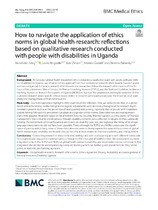How to navigate the application of ethics norms in global health research: Refections based on qualitative research conducted with people with disabilities in Uganda

View/
Date
2021Author
Mac‑Seing, Muriel
Ringuette, Louise
Zarowsky, Christina
Metadata
Show full item recordAbstract
As Canadian global health researchers who conducted a qualitative study with adults with and with‑
out disabilities in Uganda, we obtained ethics approval from four institutional research ethics boards (two in Canada
and two in Uganda). In Canada, research ethics boards and researchers follow the research ethics norms of the TriCouncil Policy Statement: Ethical Conduct for Research Involving Humans (TCPS2), and the National Guidelines for Research
Involving Humans as Research Participants of Uganda (NGRU) in Uganda. The preparation and implementation of this
qualitative research raised specifc ethical issues related to research participant privacy and the importance of avail‑
ability and management of fnancial resources. Our feld experience highlights three main issues for refection. First, we demonstrate that, in a global
health research context, methodological and logistic adjustments were necessary throughout the research imple‑
mentation process to ensure the protection of study participants’ privacy, especially that of people with disabilities,
despite having followed the prescribed Canadian and Ugandan ethics norms. Data collection and management
plans were adapted iteratively based on local realities. Second, securing fnancial support as a key aspect of fnancial
management was critical to ensure privacy through disability-sensitive data collection strategies. Without adequate
funding, the recruitment of research participants based on disability type, sex, and region or the hiring of local sign
language interpreters would not have been possible. Third, although the TCPS2 and NGRU underscore the signif‑
cance of participants’ privacy, none of these normative documents clearly express this issue in the context of global
health research and disability, nor broadly discuss the ethical issue related to fnancial availability and management.
